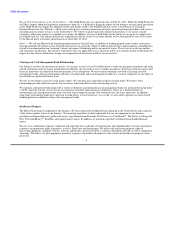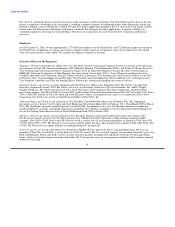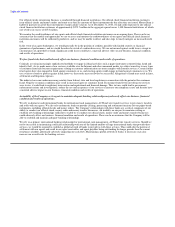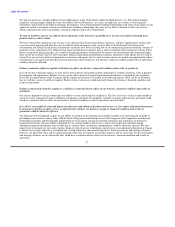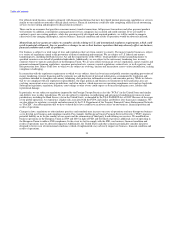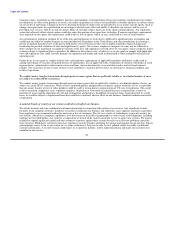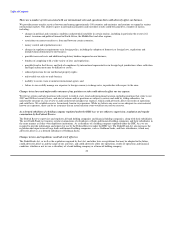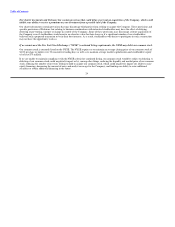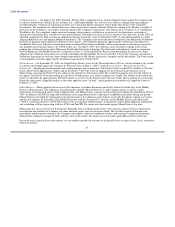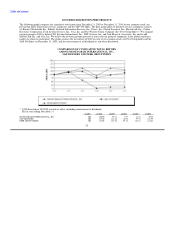MoneyGram 2010 Annual Report Download - page 22
Download and view the complete annual report
Please find page 22 of the 2010 MoneyGram annual report below. You can navigate through the pages in the report by either clicking on the pages listed below, or by using the keyword search tool below to find specific information within the annual report.
Table of Contents
Our official check business competes primarily with financial institutions that have developed internal processing capabilities or services
similar to ours and do not outsource official check services. Financial institutions could also offer competing official check outsourcing
services to our existing and prospective official check customers.
There can be no assurance that growth in consumer money transfer transactions, bill payment transactions and other payment products
will continue. In addition, consolidation among payment services companies has occurred and could continue. If we are unable to
continue to grow our existing products, while also growing newly developed and acquired products, we will be unable to compete
effectively in the changing marketplace, and our business, financial condition and results of operations would be adversely affected.
MoneyGram and our agents are subject to a number of risks relating to U.S. and international regulatory requirements, which could
result in material settlements, fines or penalties or changes in our or their business operations that may adversely affect our business,
financial condition and results of operations.
Our business is subject to a wide range of laws and regulations that vary from country to country. The money transfer business is subject
to a variety of regulations aimed at the prevention of money laundering and terrorism. We are subject to U.S. federal anti-money
laundering laws, including the Bank Secrecy Act and the requirements of the OFAC, which prohibit us from transmitting money to
specified countries or on behalf of prohibited individuals. Additionally, we are subject to the anti-money laundering laws in many
countries where we operate, particularly in the European Union. We are also subject to financial services regulations, money transfer and
payment instrument licensing regulations, consumer protection laws, currency control regulations, escheat laws, as well as privacy and
data protection laws. Many of the laws to which we are subject are evolving, unclear and inconsistent across various jurisdictions, making
compliance challenging.
In connection with the regulatory requirements to which we are subject, there has been increased public attention regarding prevention of
money laundering, terrorist financing and the corporate use and disclosure of personal information, accompanied by legislation and
regulations intended to strengthen anti-money laundering, data protection, information security and consumer privacy. While we believe
that we are compliant with our regulatory responsibilities, the legal, political and business environments in these particular areas are
evolving, inconsistent across various jurisdictions, and often unclear, which increases our operating compliance costs and our legal risks.
Subsequent legislation, regulation, litigation, court rulings or other events could expose us to increased program costs, liability and
reputational damage.
In particular, we are subject to regulations imposed by the Foreign Corrupt Practices Act (the "FCPA") in the United States and similar
anti-bribery laws in other jurisdictions. We are also subject to reporting, recordkeeping and anti-money laundering provisions in many
jurisdictions, including the Bank Secrecy Act in the United States, as amended by the USA PATRIOT Act of 2001. Because of the scope
of our global operations, we experience a higher risk associated with the FCPA and similar anti-bribery laws than many companies. We
are also subject to regulatory oversight and enforcement by the U.S. Department of the Treasury Financial Crimes Enforcement Network,
or "FinCEN." Any determination that we have violated these laws could have an adverse effect on our business, financial position and
results of operations.
Changes in laws, regulations or other industry practices and standards may increase our costs of operations and may disrupt our business
as we develop new business and compliance models. For example, the European Union's Payment Services Directive ("PSD") imposes
potential liability on us for the conduct of our agents and the commission of third party fraud utilizing our services. We modified our
business operations in the European Union in 2009 and 2010 in light of PSD and will likely experience additional costs of operating in
the European Union to address PSD compliance. In the event we fail to comply with the PSD, our business, financial condition and
results of operations may be adversely impacted. Additionally, the United States and other countries periodically consider initiatives
designed to lower costs of international remittances which, if implemented, may adversely impact our business, financial condition and
results of operations.
19


